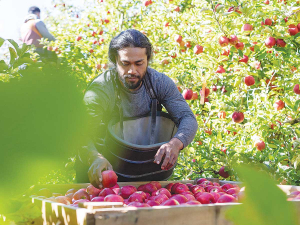Apple growers in waiting game in the wake of Gabrielle
Some apple orchardists in Hawke's Bay will have to wait up to three months to find out to what degree their trees have survived from the ravages of Cyclone Gabrielle.
 Apple and Pears NZ says urgent government assistance is need for the apple sector, which employs thousands of people all the way down that value chain. Photo Credit: Paul Sutherland Photography
Apple and Pears NZ says urgent government assistance is need for the apple sector, which employs thousands of people all the way down that value chain. Photo Credit: Paul Sutherland Photography
Chair of Apples and Pears NZ Richard Punter says there are different views on whether orchards that are impacted by water and silt can be repaired and apples planted in the same ground.
He told Hort News with the trees and debris and the bulk of the silt gone, there is still a thin layer of silt left. He says some experts believe this can be worked into the soil and things will be fine. However, others are much less optimistic. Before any decision on what to do next is made, Punter says there will have to be much greater testing of the soil.
"The problem for the 80 growers affected is that you can't insure the trees, so the damage to the orchard blocks is uninsurable," he explains. "The challenge for growers in this situation is firstly to decide if they want to try and reinstate their orchards and if they do where do they get the capital to do this."
To that end, Punter emailed government ministers last week outlining the problem and suggesting ways in which government might be able to help. The key point is a request that some sort of financial package be offered by government to bona fide growers with a good track record to enable them to get their orchards up and running again. The concept of a suspensory loan is what he's proposing. Punter points out that if the growers are not looked after, this would have a massive economic impact on the whole province.
"The 80 (apple orchards impacted) are just the ones at the beginning of a value chain that ends up in the supermarket," he told Hort News.
"There are thousands of people employed all the way down that value chain ranging from orchard staff, packhouse people and an array of service people who support the apple industry. To lose that chunk of industry out of Hawke's Bay when it was always regarded as a bright spot for our ag industry would be a huge price to pay."
Punter says they are grateful for the government assistance so far, but crunch time is coming, and it may take some orchardists up to five or more years before they can get a commercial crop off newly planted trees.
He says growers are not asking for a straight handout but for a scheme that provides some breathing space for affected orchardists and the community to get back on their feet economically.
Richard Punter says they don't have the data for Gisborne orchards yet, but that is being gathered and will be made available to government as soon as it's complete.
The Meat Industry Association of New Zealand (MIA) today announced that Chief Executive Officer Sirma Karapeeva has resigned from the role.
The winners of the 2026 Hawke’s Bay/Wairarapa Dairy Industry Awards were announced at the annual awards dinner held at Copthorne Solway Park in Masterton on Thursday evening.
Environment Southland is welcoming this week’s decision by the Environmental Protection Authority (EPA) to approve the release of Blaptea elguetai, a leaf‑feeding beetle that will help control the highly invasive Chilean flame creeper.
This March, the potato industry is proudly celebrating International Women’s Day on 8 March alongside the International Year of the Woman Farmer, recognising the vital role women play across every part of the sector — from paddocks and packhouses to research, leadership, and innovation.
Fruit trader Seeka posted a record profit and returns to shareholders in 2025.
Recent weather events in the Bay of Plenty, Gisborne/Tairawhiti, and Canterbury have been declared a medium-scale adverse event.

OPINION: A mate of yours truly reckons rural Manawatu families are the latest to suffer under what he calls the…
OPINION: If old Winston Peters thinks building trade relations with new nations, such as India, isn't a necessary investment in…